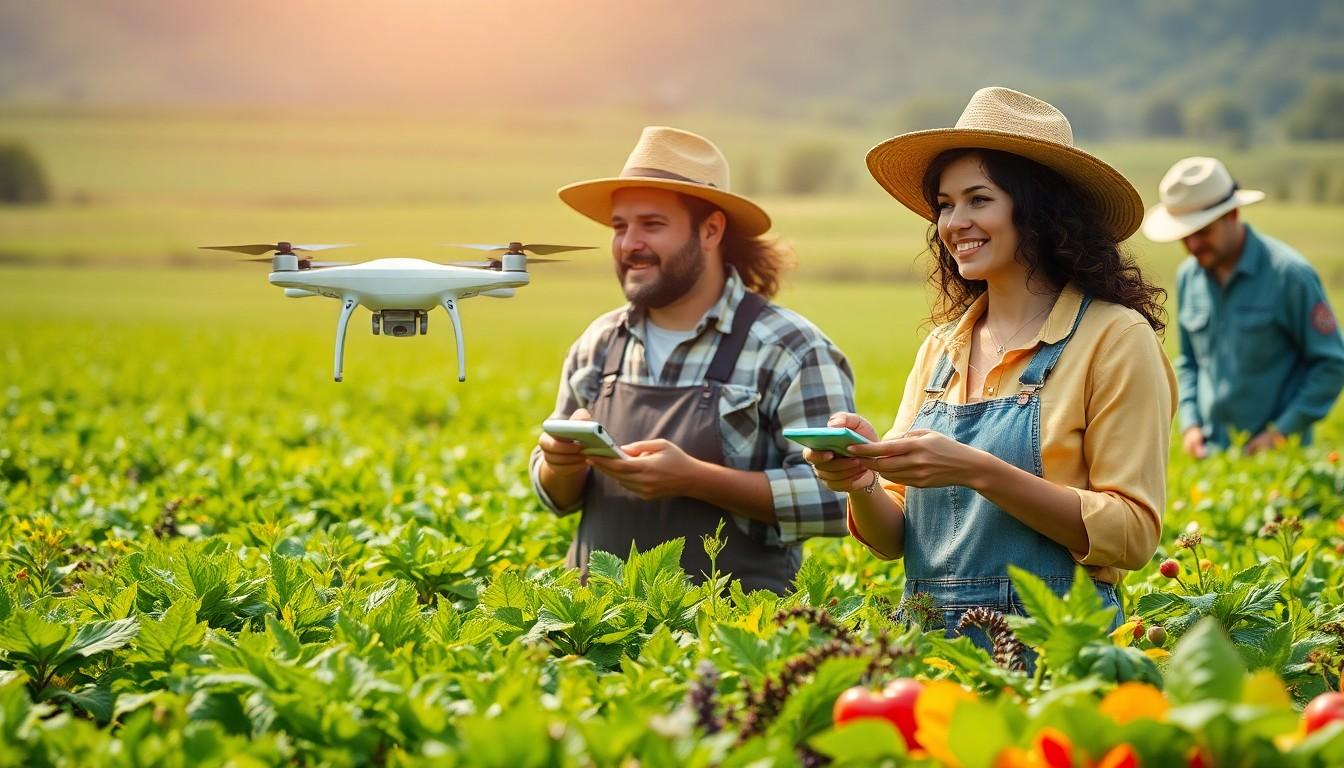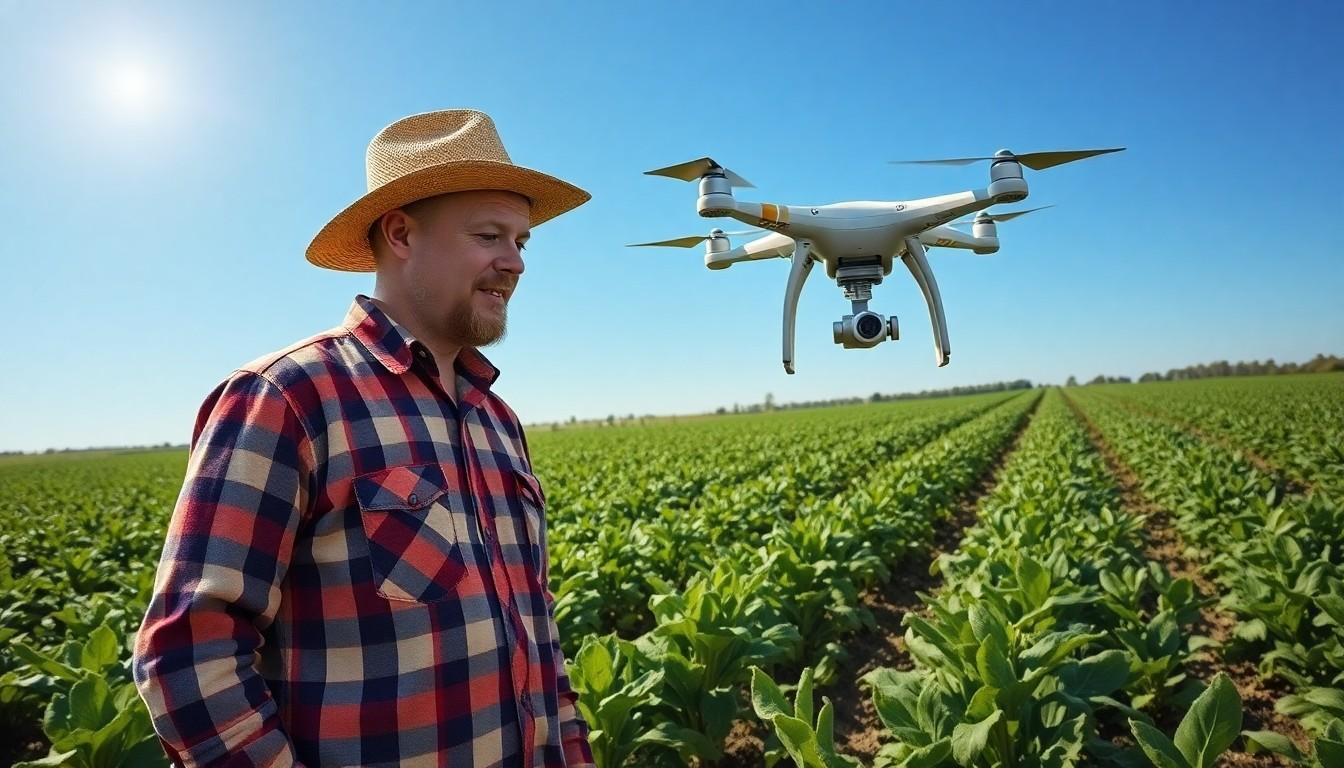In a world where the only thing growing faster than technology is the global population, sustainable farming technology has emerged as the superhero we never knew we needed. Imagine a future where crops thrive without draining the planet’s resources, and farmers can finally stop fighting with Mother Nature. It’s not just a dream; it’s happening right now, and it’s time to dig in.
From drones that monitor crop health to sensors that optimize water use, sustainable farming tech is revolutionizing the way we cultivate our food. This isn’t just about saving the planet; it’s about making farming smarter, more efficient, and surprisingly fun. So grab your virtual pitchfork and get ready to explore how these innovations are turning the agricultural world upside down, one eco-friendly solution at a time.
Table of Contents
ToggleOverview of Sustainable Farming Technology
Sustainable farming technology encompasses innovative practices and tools designed to promote environmental stewardship while enhancing agricultural productivity. This approach addresses the urgent need for eco-friendly methods amid increasing global food demands. Technologies like precision agriculture utilize data analytics to reduce resource waste, improving crop yields without straining the ecosystem.
Drones serve a pivotal role in monitoring crop health, providing farmers with real-time data to identify issues promptly. Equipped with high-resolution cameras, these devices enable the assessment of plant vitality and pest infestations from above. They contribute significantly to efficient resource management by pinpointing areas in need of attention.
Sensors also play a vital role in sustainable farming, specifically regarding water usage. Implementing soil moisture sensors allows farmers to apply water only when necessary, minimizing waste and conserving this vital resource. This technology fosters responsible irrigation practices, reducing runoff and protecting local waterways.
Biotechnology represents another critical advancement in sustainable farming. Genetically modified crops can withstand harsh conditions and pests, resulting in lower chemical usage. Farmers benefit from higher resilience and reduced dependency on synthetic fertilizers, aligning with sustainability goals.
Automation in agriculture further enhances efficiency. Robotic systems can assist in planting, weeding, and harvesting with remarkable precision. By decreasing labor intensity, farmers can focus on strategic decision-making and long-term planning.
Sustainable farming technology illustrates a transformative shift in agriculture, aligning food production with environmental responsibility. Each innovation contributes to a future where farming thrives without compromising the planet’s resources.
Benefits of Sustainable Farming Technology

Sustainable farming technology offers significant advantages, impacting both environmental health and economic viability.
Environmental Impact
Sustainable farming practices significantly reduce greenhouse gas emissions. Implementing precision agriculture techniques leads to less fertilizer and pesticide runoff into ecosystems. Enhanced soil health results from practices like crop rotation and cover cropping, which improve biodiversity. Utilizing drones for monitoring allows farmers to detect issues promptly, minimizing resource waste. Water conservation measures, such as precision irrigation, optimize usage, ensuring resources sustain future generations. Biodiversity thrives as integrated pest management systems reduce chemical applications while promoting beneficial species.
Economic Advantages
Economic benefits arise from increased efficiency in modern farming. Sustainable technologies often decrease operational costs by minimizing resource waste. Farmers adopting these practices frequently enjoy higher crop yields that translate to better profit margins. Access to data analytics empowers farmers to make informed decisions, streamlining processes across operations. Government incentives frequently support farmers transitioning to eco-friendly practices, lowering initial investment barriers. Consumer demand for organic produce continues to grow, offering new market opportunities for sustainable products.
Types of Sustainable Farming Technology
Sustainable farming technology encompasses various innovative practices and tools designed to enhance agriculture while protecting the environment. These technologies promote efficiency and responsible resource management.
Precision Agriculture
Precision agriculture utilizes advanced data analytics to optimize farming practices. This technology allows farmers to gather real-time data on crop health, soil conditions, and weather patterns. Using GPS and satellite imagery, producers can apply fertilizers and pesticides more accurately, minimizing waste. By monitoring crop growth closely, farmers can make timely decisions that lead to improved yields and reduced costs. Significant advantages emerge from adopting precision agriculture, including enhanced productivity and environmental sustainability.
Renewable Energy Solutions
Renewable energy solutions play a vital role in sustainable farming practices. Solar panels and wind turbines can power irrigation systems and greenhouses, reducing dependency on fossil fuels. By harnessing natural resources, farmers lower operational costs while contributing to a cleaner environment. Additionally, utilizing bioenergy from agricultural residues creates an opportunity for circular resource use. Implementing these renewable technologies helps farms remain viable while supporting broader sustainability goals within the agriculture sector.
Water Conservation Techniques
Water conservation techniques are crucial for sustainable farming, particularly in areas facing water scarcity. Methods such as drip irrigation allow for precise, efficient water delivery, reducing runoff and evaporation. Rainwater harvesting systems capture and store rainwater for agricultural use, promoting responsible water management. Soil moisture sensors enable farmers to monitor hydration levels, ensuring optimal irrigation scheduling. Implementing these techniques leads to reduced water usage, enhanced crop resilience, and better overall environmental stewardship.
Challenges in Implementing Sustainable Farming Technology
Sustainable farming technology faces several challenges that hinder widespread adoption. Financial issues and technological barriers significantly impact farmers’ ability to transition to eco-friendly practices.
Financial Constraints
Funding for sustainable farming technology often remains limited. Many farmers struggle to afford the initial investments required for advanced equipment and systems. Without access to affordable financing options, smaller farms, in particular, face substantial obstacles. High operational costs also deter some from adopting innovative practices. Despite the long-term savings and benefits, upfront expenses can create a significant barrier to entry. Government grants and incentives can help alleviate some of these financial pressures, yet availability and awareness of these programs vary widely.
Technological Barriers
Technological know-how poses another challenge in sustainable farming technology. Many farmers lack training on the latest advancements, such as precision agriculture or remote sensing tools. Limited access to high-speed internet in rural areas further complicates the effective use of technology. Additionally, not all farmers can integrate cutting-edge tools into existing operations seamlessly. Adoption of these technologies often requires not only knowledge but also ongoing support and maintenance. Resistance to change can persist among traditional farmers who may prioritize conventional practices over untested innovations. Addressing these technological barriers is critical for fostering a more sustainable agricultural landscape.
Future Trends in Sustainable Farming Technology
Emerging trends in sustainable farming technology emphasize innovative solutions that align with ecological preservation and efficient crop management. Vertical farming systems gain traction by optimizing space and reducing land degradation. Integrating artificial intelligence into agricultural practices enhances predictive analytics, which helps in identifying crop performance issues before they escalate.
Developments in gene editing technologies, like CRISPR, promise to produce resilient crop varieties. Such innovations minimize the need for chemical inputs while increasing overall yield potential. Additionally, blockchain technology offers transparency in supply chains, enabling consumers to trace the origins of their food sustainably.
Utilization of IoT devices continues to rise, allowing real-time monitoring of field conditions. Farmers benefit from immediate data on soil health, moisture levels, and pest activity, making informed decisions easier. Automation becomes increasingly prevalent with robotic systems assisting in tasks such as planting, harvesting, and weeding, which reduces labor costs and enhances efficiency.
Drone technology’s capability for precision mapping leads to better resource allocation, minimizing waste and maximizing productivity. Climate-smart agriculture practices adapt to changing weather patterns, ensuring crop viability in the face of climate change. Innovations in renewable energy integration, including biogas and solar energy systems, support sustainable farming operations while lowering energy costs.
Regenerative agriculture practices gain attention as they restore soil health and promote biodiversity. Collaboration among stakeholders, including governments, entrepreneurs, and researchers, fuels these advancements by fostering knowledge sharing and access to funding. Investing in education and training empowers farmers to embrace these technologies effectively, paving the way for a sustainable agricultural future.
Sustainable farming technology is reshaping the agricultural landscape by promoting practices that align with environmental stewardship and economic viability. As innovations continue to emerge farmers can leverage these advancements to enhance productivity while minimizing their ecological footprint. The integration of tools like precision agriculture and renewable energy solutions not only addresses the pressing challenges of food security but also fosters a healthier planet.
Investing in education and collaboration among stakeholders is essential for overcoming barriers to adoption. By embracing these technologies farmers can cultivate a future where agriculture thrives in harmony with nature. The shift towards sustainable farming is not just a trend; it’s a necessary evolution for the well-being of both the planet and future generations.





